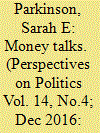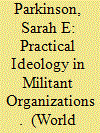|
|
|
Sort Order |
|
|
|
Items / Page
|
|
|
|
|
|
|
| Srl | Item |
| 1 |
ID:
150501


|
|
|
|
|
| Summary/Abstract |
Scholarship on militant organizations and rebel movements emphasizes the effects of fragmentation and disunity on military and political outcomes. Yet this scholarship’s focus on formal, durable, and externally observable aspects of organizational structure omits the social practices that constitute, reinforce, and reproduce intra-group schisms. How do intra-organizational divisions calcify into permanent cleavages? What processes reproduce factions over time? Using the case of Fatah in Lebanon, I argue that informal discursive practices—e.g., gossip, jokes, complaints, storytelling—contribute to the maintenance and reproduction of intra-organizational factions. Specifically, I focus on how networks of meaning-laden, money-centric discourse structure relations among militants who identify as being “Old Fatah.” I demonstrate that while these practices frequently originate in the organizational realm, cadres subsequently reproduce them within kinship, marriage, and friendship networks. This “money talk” between age cohorts within the quotidian realm connects younger members of Fatah to older cadres through collective practices and conceptions of organizational membership. These practices both exemplify an intra-organizational schism and constitute, in part, the faction called Old Fatah. Examining how symbolic practice comprises social structure thus provides important insight into the politics of organizations such as militant groups, social movements, and political parties.
|
|
|
|
|
|
|
|
|
|
|
|
|
|
|
|
| 2 |
ID:
179160


|
|
|
|
|
| Summary/Abstract |
Ideology shapes militant recruitment, organization, and conflict behavior. Existing research assumes doctrinal consistency, top-down socialization of adherents, and clear links between formal ideology and political action. But it has long been recognized that ideological commitments do not flow unaltered from overarching cleavages or elite narratives; they are uneven, contingent, fraught with tension, and often ambivalent. What work does ideology do in militant groups if it is not deeply studied, internalized, or sincerely believed? How can scholars explain collective commitment, affinity, and behavioral outcomes among militants who clearly associate themselves with a group, but who may not consistently (or ever) be true believers or committed ideologues? I argue that practical ideologies—sets of quotidian principles, ideas, and social heuristics that reflect relational worldviews rather than specific published political doctrines, positions, platforms, or plans—play a key role in militant socialization through everyday practices. Ethnographic evidence gained from fieldwork among Palestinians in Lebanon demonstrates how militants and affiliates render ideas about ideological closeness and distance accessible through emotional, intellectual, and moral appeals. This approach reaffirms the role of discourse and narrative in creating informal mechanisms of militant socialization without expressly invoking formal doctrine.
|
|
|
|
|
|
|
|
|
|
|
|
|
|
|
|
|
|
|
|
|